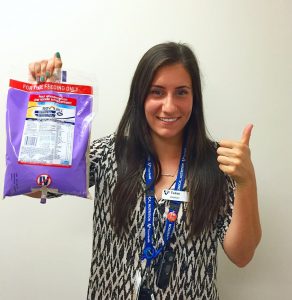Name: Talise Grossman
Registered Dietitian: 5 years
Employment: Clinical Dietitian with Fraser Health
UBC Clinical Preceptor: 3 years
A Little Bit About Talise
Talise graduated high school with an interest in nutrition and decided to pursue a career in dietetics. She graduated from UBC’s Dietetics Program and went on to work as a dietitian in the clinical ward in Fraser Health and has been working there ever since!
What Being a Preceptor Means to Talise
Talise believes that the role of a preceptor changes as a student moves along their journey in practice education. She states, “In the beginning, the preceptor acts as an educator to the student and shows them the ropes. As the student progresses through practice education, they start to learn and take different things from different preceptors and adopt their own way of practice.”
To Talise, being a preceptor means guiding the students through the profession, especially in the beginning when they are unfamiliar with how to put their learning to practice.
Advice for Incoming Year 5 Students
Talise advises year 5 students to become comfortable with talking to strangers, doctors, other health professionals, and people in general! She emphasizes the importance of developing strong communication skills through other volunteer or work experiences as most students may feel timid at the beginning of practice education.
Another piece of advice she offers is for students to forgo the idea that they must think and do everything in the exact same way as their preceptor(s). She says, “often times students think there is only one right way to do something, but that is not the case. One dietitian may do things one way, while another may have a different rationale. As long as the student is able to provide some evidence to back up their rationale, they should not be afraid to voice ideas that may differ from that of their preceptors’.”
Advice for Current and Prospective Preceptors
Talise advises current preceptors to spend some time observing their students, and to not “give them too much freedom too soon!” She notes that, like many things, “the more time and effort you put into the students, the more they (and you) will get out of it.” This may include checking in on all their patient interviews and reviewing all their chart notes, even if the preceptor is confident that the student is doing well. Doing so will help the student with developing adequate critical-thinking skills, as well as help with their self-assessment of their work.
By: Nicole Huang, Dietetics Program Assistant
